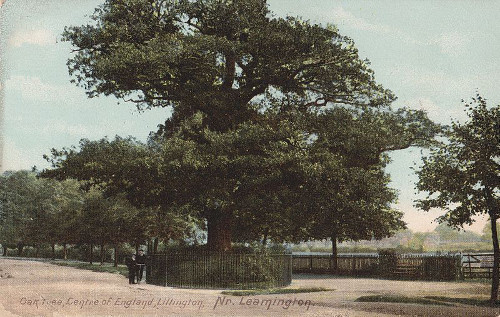My First Day at Work
This was during the first week of September 1966.
The era of Mods, parkas, scooters (I had a Lambretta 150 Li). Was this the year of the summer of love? Then flower power, kaftans, the Stones, the Who, Geno Washington and his Ram Jam Band, Ska, Radio Caroline and much more.
Halcyon days.
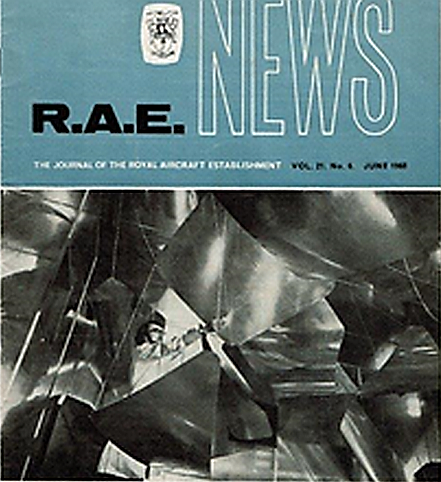
First of all though I had to report to the Personnel Office.
There waiting in reception at 9am, also to join the Establishment was a very attractive, petite girl with brown hair curving around her sweet face.
I was smitten.
We exchanged brief hellos and smiles, but being a little shy I missed the golden opportunity to make my mark on the social scene at Farnborough as a newcomer. I would occasionally see her around the complex and in the canteen but could never summon up enough courage to take our initial brief encounter any further. Oh what might have been?
And Concorde? I was smitten by her as well.
What an era.
Many years later I flew in her. Fabulous, fantastic.
She still is.
I have fifteen model Concordes at home.
Nigel Briggs
Many schools in the 1970`s sent their pupils on work experience to enable them to decide on their future. Unlike today this was all organised for us. So as a member of the Lower Sixth I was assigned to Lillington Primary School where I was put into the hands of the redoubtable Mrs Enoch.
The early sessions were spent hearing readers. Mrs Enoch was Deputy Head at that time and seemed to embody efficiency – she made it all look so easy! In the fullness of time I was given more responsibility and Mrs Enoch would prepare a story to be written or a comprehension exercise and I would sit with the class – provide vocabulary and spelling - while she carried out duties elsewhere. Although I didn`t think it was remarkable at the time, the children just got on with their work – Mrs Enoch`s word was enough.
Flushed by the success of my initial experience in the world of teaching I decided to apply to teacher training college in London. On my various teaching practices I looked back at my naivety. It wasn`t so easy to establish that sense of purpose and enjoyment as I had thought! As I spent time in Elephant and Castle in a Victorian building during the bin strike I also remembered the bright cheery Junior 4 classroom with its geraniums on the window ledge back in Lillington.
Another early experience was working on the Christmas Post. My route included Leicester Street and up to the prefabs. We were put into pairs – the boys carried the sack and the girl ran up the drives. Many people were very kind and gave us sweets and tips. During this time of isolation [April 2020] I have done that walk in and out of town and the hill is as steep as ever.
After forty years at the chalk face I am pleased to be looking at the Census returns for Lillington School from 1899 until 1936. Similar forms are still completed by schools today, so some things don`t change too much!
Claire Walsh
My first day at work was at Woolworth on the Parade, Leamington, in the warehouse, stock taking with sisters Eileen and Margaret Johnson. We had to count the tins of paint. I could not get my head round the system, “2 over 12”, only to be told if there were, for example, 2, 3 or 4 over, that did mean there were only that many left out of a pack of twelve.
Thus my name from then on was “Knowledge Box”. Of course that was them taking the mickey, but it was all taken in good spirit.
In later years my daughter Helen ended up school friends with Margaret‘s daughter, Jackie Ellard, at Lillington School.
Mary Kelly
I started work at Automotive Products, then I think called Lockheed, on the Tachbrook Road, in August 1964.
I was 15 and very naive. I was an 'Office Junior' in with a whole load of men, in the Borg and Beck part of the factory. We were in the Planning Department. The men were mostly drafts-men and engineers, and I a lowly junior, employed to file all day!
There was also a little old lady, called Elsie, who smelt of '4711' which was a popular perfume at the time. She was probably about late fifties, but seemed very old to me. She was kindly and quite plump.
There was one lady drafts-woman, way down the other end of the office, and it was a very long office, approximately 40 foot long. I was not introduced to her, but found out later her name was Ann. I was very nervous and felt totally out of my depth. There an office manager, small and quite bumptious but kindly too.
I was shown how to clock in, which we had to do every morning and lunchtime, then clock out in the evening. I was told it was my job to walk through the factory to the stores to collect the drafts-men's paper and equipment, but I was spared this the first day. I was later to find out how I was expected to carry big rolls of this paper plus boxes of other items, with no help, from the stores, which was way over the other side of the factory, back to our office being wolf-whistled on the way, which was quite the norm in those days. I would go scarlet with embarrassment.
My dad worked in the factory, as did half of Leamington at the time. He was a Stacka truck driver, and at lunchtime he took me home on his Lambretta scooter for dinner. I got changed when I got home as I thought my first outfit was out of place in the office, though I doubt anyone even noticed what I was wearing.
I hated the filing, as the paper plans which I had to file were printed on paper with a dry sort of printer ink which felt rough to my fingers. I did have a desk and chair too, so I did get to sit down, as I had to sort the plans into order and fold neatly before filing. My desk was close to Elsie, and in the morning and afternoon a lady came around with a trolley with cups and saucers and served us coffee and tea, which we had to pay for I believe.
I started at 8.30am and clocked out at 5.30pm. Was I glad to get home that day. It was a bewildering and frightening experience, but I had to do it again the next day, and worked in the Planning Office and later on Work Study, before going into the typing pool about 18 months later.
Barbara Blackwell.
The summer I left school, I worked at the Sun-Pat Peanut factory in the next town to where I lived, a bus-ride and a long walk away. The girls who worked there all the time were only a bit older than we were, and most of them were doing the job on piece rates, to save up to get married. They were so fast at everything they did, and had a way of lip-reading 'chatting' when they worked.
We schoolgirls felt so stupid - especially when they sent us to get things like 'Raw Mats'. It was days before we twigged that that was 'Raw Materials' - much to their amusement. They loved it because we grammar school girls were so hopeless, and they were so skilled at their job.
The factory also made Elizabeth Shaw chocolates, and we were told on the first day that we could eat as much as we liked! It didn't last long - the overpowering smell of cooking chocolate soon cured us all of that. Maybe that's why I've never been mad-keen on chocolate!
Margaret Rushton
It's early September 1960. The day before the start of term in a large boys' secondary school in south east London. We are all gathered, over one hundred of us, for the staff meeting. I know no one and didn’t realise that you had to bring your own mug.
The Deputy Head addresses us. They call him Sarge because that's what he was in the war. He hasn't changed his style. Boys have been throwing milk bottles from the roof into the playground. It's got to STOP. Some of the chains in the desks (apparently to stop the lid flying forward and cracking the back of the head of the boy in front) have been REMOVED. It has to STOP.
We have broken into subject meetings. I am number 9 in an English department of 9. We are given our timetables. The school is in three streams. The A stream (academic/passed the 11+ but not by enough to get into a Direct Grant grammar school), the G stream (secondary modern), and the P stream (practical!!!).
I have a good spread of classes across the ability range. My tutor group is 1P2. 1 is the year group (1st years), P is practical? paranoid? plodding?, and 2 are the boys deemed not up to the challenge of 1P1.
Actually they were a great group and taught me a lot. I can still remember some names: O***A who was Spanish and who had previously got away with doing no work at all by pretending he didn't understand English, D**W who treasured and used new words and vocabulary as if they were jewels, and E**S who successfully masterminded a gang of nine shoplifters from my tutor group for a six month stealing spree in Lewisham market. The day they were brought to justice was the only occasion in my time in the school that the Head visited my classroom.
Chris Rhodes
Automotive Products, Tachbrook Road
Watch Out for Stacker Trucks!
Starting at Exeter in 1980, my university career coincided with Margaret Thatcher’s first recession, so I put off the evil moment of having to look for work by swapping from a three-year degree to four-years. But I had no wish to stay in academe for ever, and I was determined to find work in what remained of private industry. The University careers people provided a directory of firms hiring graduates, and I wrote to the first twenty listed under “A” & “B” which were within 100 miles of my home town of Derby, and who offered graduate traineeships in engineering. “A” for Automotive Products came up trumps and offered me an interview in July, 1984.
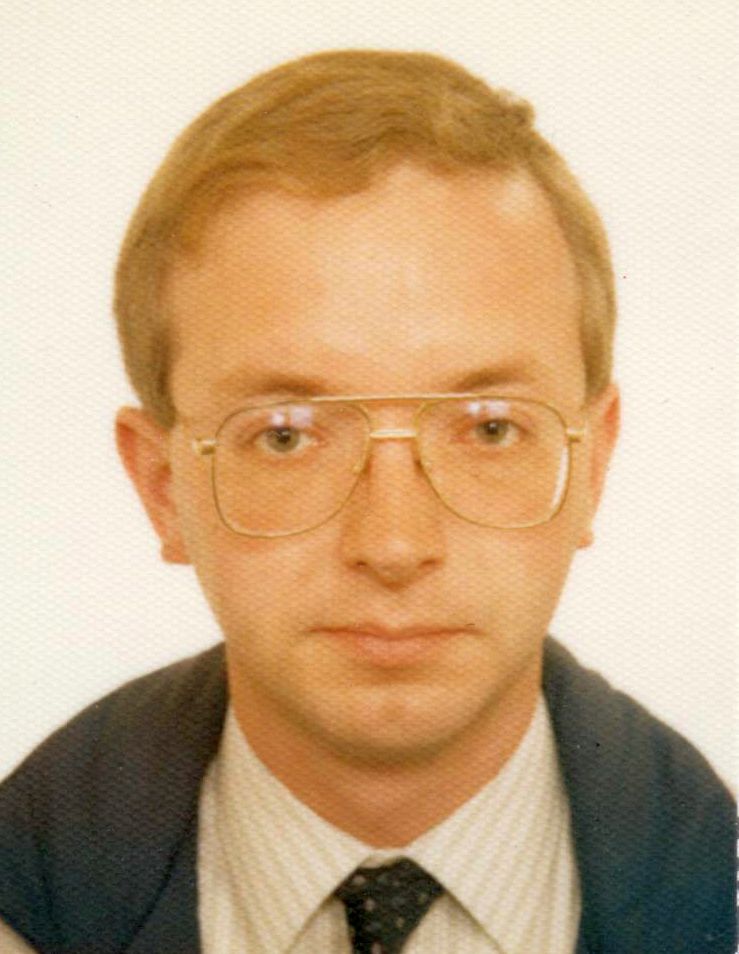
There were three on the panel. Someone quite senior from the Research department, with Derek Butter, the training manager, and Bill Clarkson. They asked about the degree at Exeter, and presently I mentioned something called “Reliability Theory” which Exeter were rather proud of and thought very go-ahead.
‘Oh, what’s that?’ the senior man asked.
‘For example,’ I explained, ‘If a thousand pumps had failed you could plot a graph of their time to failure, and find the average life of the design.’
‘And how would that help?’ he asked.
‘Well it would allow you to be very wise after the event,’ I replied, which made them all laugh.
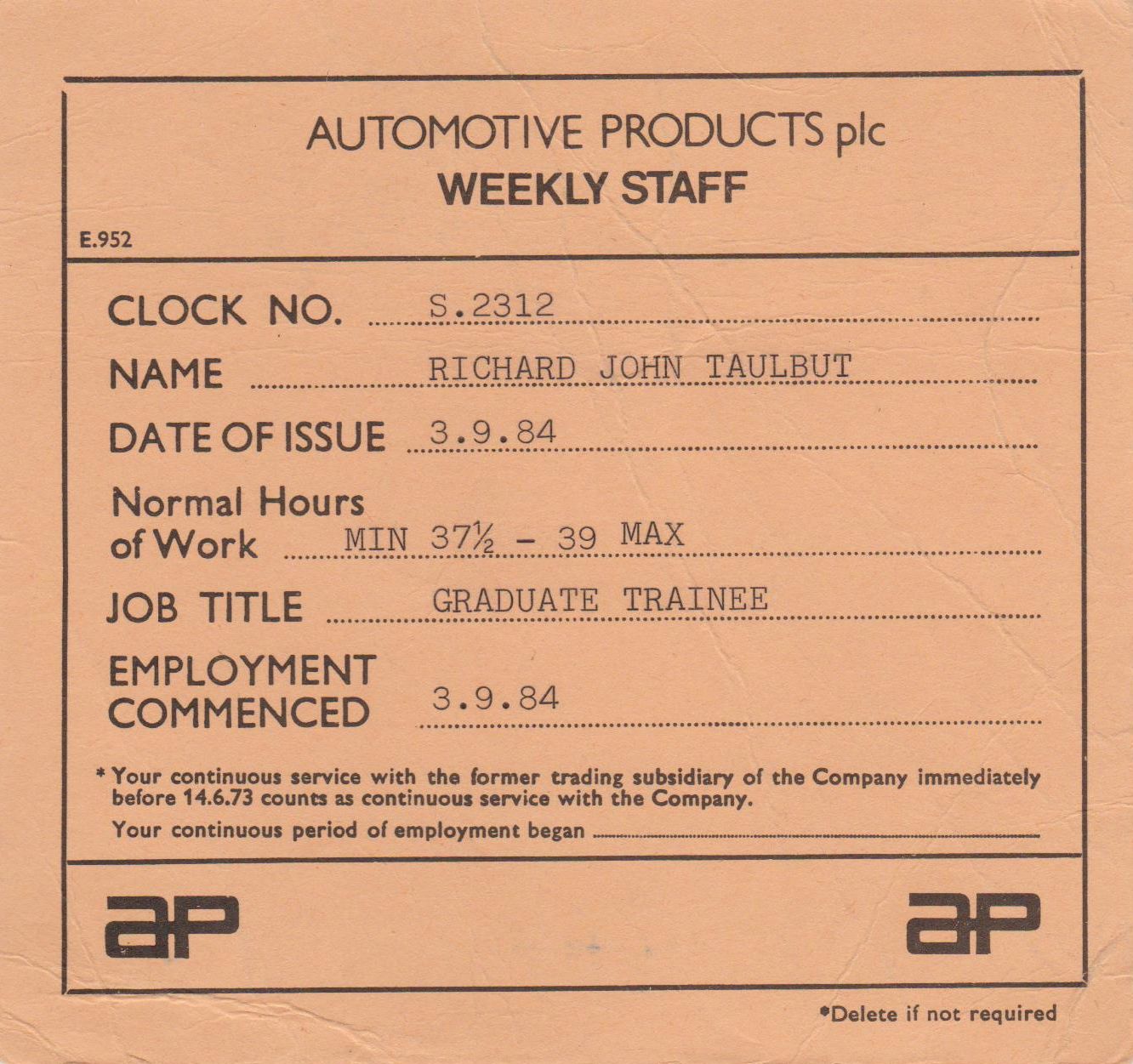
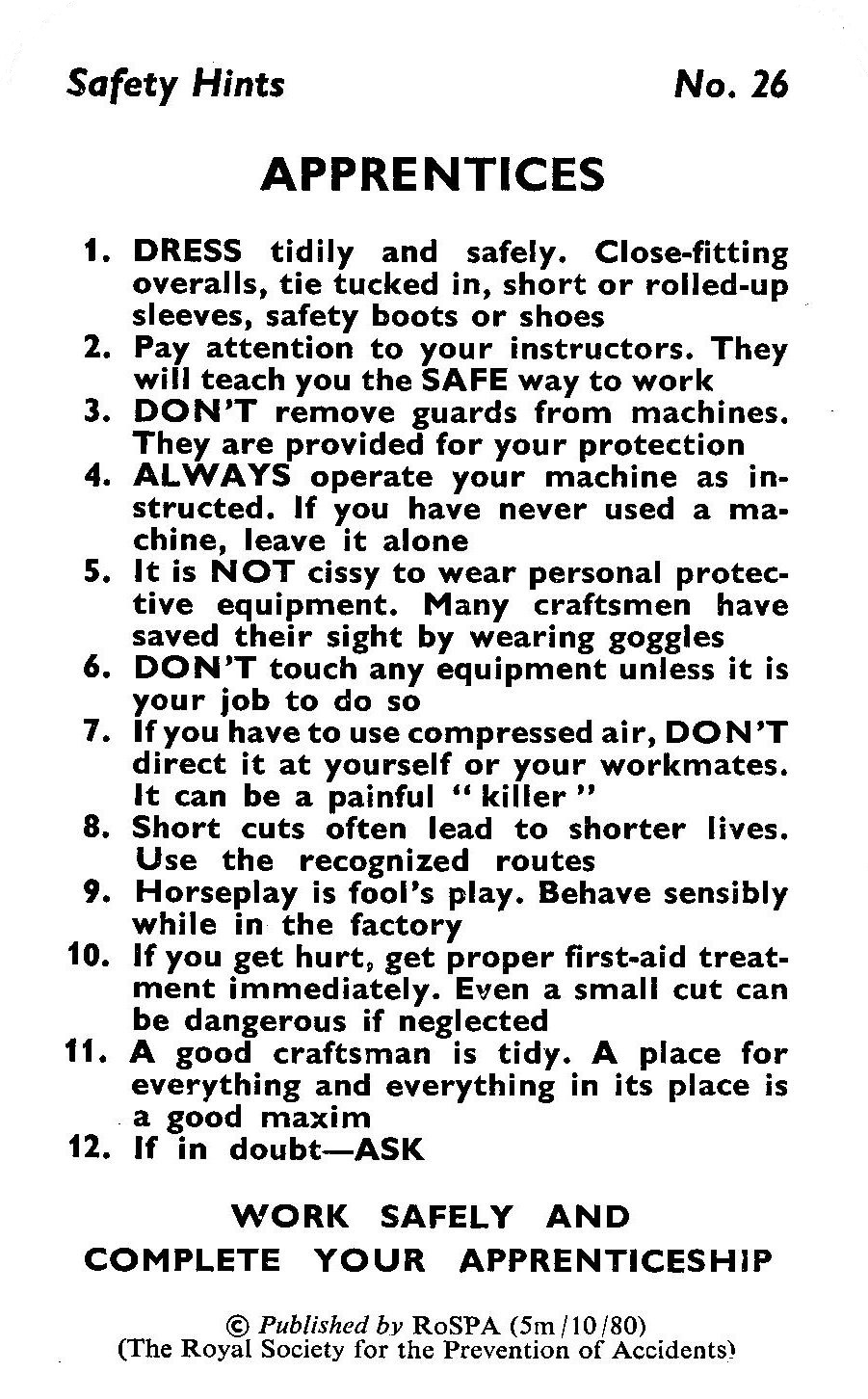
I started work at AP on Monday 3rd September, 1984. Most of the first day was taken up with talks from the training manager and others about what we would be doing, with a particularly graphic talk from the safety officer, who came with some exhibits from his black museum of items which had caused gruesome accidents around the works. And most of all, he and everyone in fact, mentioned several times, ‘Don’t get run over by a Stacker Truck. Keep six feet away from them at all times. They won’t see you and they don’t stop!’
When my two years training was up, I got a place in Brakes working on an antilock braking system for Fiat and Iveco among others. I and the team spent periods testing on frozen lakes in northern Sweden, and at the end of one season’s testing the Swedish test drivers came to Leamington for a visit, and we were all photographed in front of Block 7. If you worked at AP (so many in Leamington did over the years) you may remember some of the names.
Richard Taulbut
(7)
To set the scene, I was living with my parents in the Police Station on the High Street, Henley in Arden. Prior to that we had been living in Stratford on Avon where I was going to King Edward VI grammar school, leaving at the end of the summer term of 1962 with 5 O-Levels and no job. I had already decided not to go into the 6th Form as I felt they would not be able to afford the next step of going to University. It was during that summer break that we moved to Henley, a time of upheaval on all fronts.
Time was passing with no obvious career path in mind, an appointment was duly made to see the Careers Advice Officer. Yes, we had them back then. I went to see her with a blank canvas. The meeting went along the lines of what wouldn’t you like to do, therefore what would you like to do, no conclusion. I mentioned that a classmate had embarked upon a career in local government as Public Health Inspector working for the City of Birmingham. Would this be something that might appeal? I had already declared that a factory life was not for me, nor was I wishing to follow my father’s footsteps and become a policeman. Incidentally, he had threatened that if I had not found a job by the end of the six-week break, he would use his influence to get me a job at the local egg-packing factory.
Somewhat belatedly I wrote the City of Birmingham, Coventry Corporation and Stratford Borough Council to see if they had any vacancies for Pupil Public Health Inspectors. Coventry and Stratford replied in the negative, I was called for interview to Birmingham. The day arrived with me catching the train to go to the Public Health Department Offices on Paradise Street, where I was interviewed by the Chief Public Health Inspector and the City’s Medical Officer of Health. I was then offered a job as a Clerk in the Public Health Department based at 120 – 124 Edmund Street near to Snow Hill railway station. The reason for being offered the position of Clerk was that the City Corporation took on 20 Pupil Public Health Inspectors per annum, with them already reaching that quota. I along with two others would be guaranteed acceptance in twelve months’ time.
Don’t worry we are getting to my first day in September 1962. I travelled early by train from Henley in Arden to Birmingham to be there for 8.45am. A short walk to my new offices was achieved in plenty of time to report along with two others, who were to be my colleagues for the next 14 years. That was how long I stayed with the City before moving to Leamington Borough Council; another story. We were taken to the Chief Clerk’s Office on the first floor. The major part of the building was occupied by Marshall & Snelgrove, with the ground and first floor frontage designated for the Public Health Department. The Chief Clerk had our interview files in front of him, so he knew a little about us and a brief chat followed. It was here that I learnt a salutary lesson - never volunteer. The question was asked of us could anyone type. You know what’s coming - I said yes as I had used my father’s portable typewriter for one fingered typing, much as I am doing now for this. Fine was the response the others remained silent, I would be taken to the Typing Pool Manager’s Office, the others were destined to the Enquiry Counter and switchboard.
A walk along the corridor took me to be introduced to ‘Sandy’ Saunders, a man of Irish descent who lived in ‘the better part of Selly Oak’ as he oft told me whilst under his guidance. I was introduced to Mae, Sandy’s assistant, with the additional comment that she had been married to Joe, her husband for the last 40 years, he had only gone to see her to tune the piano and she wouldn’t let him go. My next move was to be introduced to the ladies of the Typing Pool; can you imagine this naïve youth walking into this alien environment. With the passage of time I can recall the names of some of the typists. Margaret who was in charge, Patricia who was married to a qualified public health inspector, Edit an Austrian émigré, Zona (not a typing error) and Christine. There were others.
The next lesson I learnt was the timing of the tea trolley with bacon rolls provided by Marshall & Snelgrove - be late and miss out. I was then taken downstairs to the offices used by the inspectors, to be confronted with a large room with approximately 40 inspectors in it. This represented half the complement of staff responsible for investigation and enforcement across half the city, which was divided into a total of 10 Districts. The other side of the building was duplicated with a further 40 inspectors. Introduction to the staff prompted a variety of greetings accompanied by one or two ribald comments from the office comedian of which there were one or two.
The rest of the day remains lost in the mist of time, although I do remember walking around the city centre exploring a completely new environment, before returning for more induction and introductions. I recall the dress code being lounge suits, the exception being on Saturday mornings when sports jackets and trousers were permitted. You may remember earlier, I referred to the proximity of Snow Hill Station. This allowed me to walk from the office in time to catch the 5.45pm train to Evesham, stopping at Henley in Arden. What more could you wish in life - a new job and a daily dose of steam railways?
Twelve months later all three Clerks were taken on as Pupil Public Health Inspectors to be joined by 17 other recruits, over whom we had an advantage of knowing the ropes and staff. My time in the typing pool enabled me to judge just how much work and associated time it took various girls to produce accurate formal legal documents before being sent out to landlords, solicitors and managing agents. I then went through 4 years of training at Matthew Boulton Technical College and the University of Aston in Birmingham as it was then called. Two days a week in College/University and three days on the District under the supervision of qualified inspectors, until I qualified. My career path was set for the next 40 years, but that’s another story.
Peter Coulls
My first job was in the Police Courts Office at Leamington Spa Police Station. I started on the 26 July 1966 at the old Police Station in High Street which is now the Polish Club.
I remember on the first day I had to go with my boss Les who was a Police Sergeant to be sworn in at the Magistrates Court, which was then held at the Town Hall in the Parade.
I remember walking back through Regent Grove and meeting my Mum. I just said hello and carried on walking with Les my boss. After she had passed he asked me who that lady was. I said, 'Oh that was my Mum.' He never forgave me for not introducing her to him. I honestly thought it wasn't allowed. How naive you are at 16!
Linda Reidy

